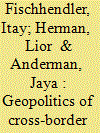| Srl | Item |
| 1 |
ID:
134148


|
|
|
|
|
| Publication |
2014.
|
| Summary/Abstract |
This article investigates structural conditions for women's inclusion/exclusion in peace negotiations by focusing on the linkage between acts of gender stereotyping and cultural framing. Through a narrative analysis of semi-structured interviews with Israeli negotiators and administrators who participated in official negotiations during the Oslo peace process, I link two recent claims about how gender may affect negotiators' understandings of strategic exchange: the gendered devaluation effect and the gender-culture double bind hypothesis. Building upon postcolonial feminist critique, I argue that narratives about women and cultural difference (a) demonstrate and engage with Israeli essentialist and Orientalist discourses about Arab culture and masculinity; (b) manifest how ideas about strategic dialogue and negotiations are gendered; and (c) convey how policymakers and negotiators may use cultural claims to rationalize women's exclusion from diplomatic and strategic dialogue. Furthermore, the study implies that dominant framings of Israeli-Palestinian negotiations as a binary East-West encounter need to be replaced by a more nuanced conceptualization of cultural identity that captures contextual aspects of difference, including the existence of military power and masculine dominance.
|
|
|
|
|
|
|
|
|
|
|
|
|
|
|
|
| 2 |
ID:
149880


|
|
|
|
|
| Summary/Abstract |
Countries often attempt to establish regional electricity grids. However, whereas research on natural resources frequently seeks to understand policy outcome through a geopolitical prism, when it comes to electricity studies the prism is always economic or technical. Hence, this study is a first attempt to identify the geopolitical dimension of cross-border electricity grids. The study argues that success in establishing electricity grids requires identifying how the geopolitical dimension interplays with the physical dimension. To examine the role of these geopolitical bottlenecks, the study examines negotiation protocols, spanning over 15 years, on establishing ten grid connections between Israel and its Arab neighbors. It finds that electricity geopolitics has been used both as a platform for deeper international cooperation and as a stick against neighboring states. When policies are driven by a peace dividend, proposals for grid connection appear to evolve and overcome the dependency and the security-economy bottlenecks. When relations deteriorate, proposals for grid connections appear to undergo reconsideration and to be held hostage by higher politics. If, when and how electricity grids materialize is a function of the nature of the electricity network as a twofold package and of the ability of the planning process to accommodate geopolitical uncertainty.
|
|
|
|
|
|
|
|
|
|
|
|
|
|
|
|
| 3 |
ID:
124354


|
|
|
|
|
| Publication |
2012.
|
| Summary/Abstract |
There was no shortage of intelligence, nor was there a lack of intelligence alerts about the Yom Kippur War. The reasons for the famous mechdal (Israel's lack of preparedness for the war) should be judged in the context of the 1973 conditions and not according to "what if…" questions. The reasons are, first, the unhealthy mixture of the military top echelon with the political leadership, which prevented the chief of staff from carrying out the appropriate military preparations on October 6, 1973. The second reason for the mechdal was a successful disinformation operation conducted by the Russians and their Arab allies. The third and main reason was the Israeli fear of "losing" the Americans-an outcome, the Israelis anticipated, of the struggle for the freedom of Soviet Jewry. For the Israeli public the war was a surprise; not for the political leadership.
|
|
|
|
|
|
|
|
|
|
|
|
|
|
|
|